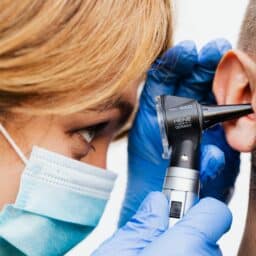Pay Attention to The Emotional Side Effects of Hearing Loss

Studies show that hearing loss can lead to psychological distress. Psychological distress from hearing loss can lead to increased vulnerability to mental health problems like depression, aggression, emotional sensitivity, and decreased well-being. Acknowledging your emotions and mental health can be the first hurdle in taking steps to improve your quality of life. One way to…
What’s The Link Between Hearing and The Brain?

Our brains play an essential role in our ability to hear. Similarly, problems like hearing loss may affect our brains in multiple ways. Let’s take a closer look at the link between the two. Hearing Loss May Affect Cognition Much research has been done on the effects of untreated hearing loss on the brain. While…
How Treating Hearing Loss Will Help Your Career

Having hearing loss can put you at a disadvantage in many areas of life, including the workplace. Thankfully, treating your hearing loss with hearing aids or other assistive listening devices can help boost your career. Hearing Aids Improve Communication in the Workplace Communication is essential to all aspects of life, and your work life is…
Tips for Avoiding Hearing Loss This Spring

The Centers for Disease Control and Prevention (CDC) reports that, “An estimated 12.5% of children and adolescents aged 6–19 years (approximately 5.2 million) and 17% of adults aged 20–69 years (approximately 26 million) have suffered permanent damage to their hearing from excessive exposure to noise.” Unfortunately, springtime is one of the times of the year…
How Your Hearing Loss Can Affect Your Immediate Family

When thinking about the importance of treating your hearing loss, it’s helpful to remember that it doesn’t just affect you. Hearing loss can be hard on your immediate family as well. Hearing Loss Negatively Impacts Spouses A 2004 study interviewed 418 older married couples over the course of five years to analyze the relationship between…
Is Hearing Loss Reversible?

For anyone experiencing hearing loss, it’s common to wonder if their hearing loss can be reversed. While many cases of hearing loss are permanent, some people also do experience temporary hearing loss that can be reversed. What Causes Temporary Hearing Loss? Most causes of temporary hearing loss are due to something blocking the ear, like…
Is There a Link Between Hearing Loss and Genetics?

Hearing loss can be caused by many things, including genetics. Let’s take a closer look at the role that genetics plays in hearing loss as well as what you can do to support your hearing health. Genetics and Newborn Hearing Loss Genetic factors often are involved in cases of newborn hearing loss. According to the…
Can Vitamin D Deficiency Cause Hearing Loss?

Many factors can increase your risk of developing hearing loss, such as aging, exposure to loud noise or certain viral illnesses. New research indicates that low levels of vitamin D could make it more likely that you develop hearing loss as well. The Importance of Vitamin D Vitamin D is an essential nutrient that your…
It’s Important To Seek Treatment for Sudden Hearing Loss Quickly

Most cases of hearing loss come on gradually. However, some people experience a rapid loss of hearing, known as sudden hearing loss. If you experience this, it’s important to seek medical attention right away. What Is Sudden Hearing Loss? As the name suggests, sudden sensorineural hearing loss (SSHL) is hearing loss that happens immediately or…
Benefits of a Hearing Test

A study published in the journal Health Technology Assessment reports, “A simple systematic screen, using an audiometric screening instrument, has been shown to be acceptable to people in the age range 55-74 years, is likely to provide substantial benefit and may be cost-effective to those in that target group.” There are many other benefits to…
